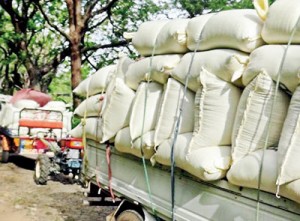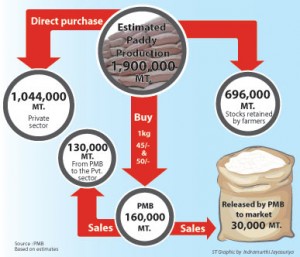News
Half-boiled solution, say paddy farmers as PMB ups buying limit
As farmer protests grow countrywide, the Paddy Marketing Board (PMB) has said it has upped its paddy-purchasing limit, but farmers say that it may still not be sufficient to solve the current crisis over the bumper Yala harvest. Long queues are still seen at the PMB purchasing centres around the country.

A common sight: A line of paddy-stocked vehicles queuing at a PMB centre in Anuradhapura. Pic by Kanchana Kumara Ariyadasa
PMB Chairman M.B Dissanayake told the Sunday Times that the PMB had now decided to buy up to 160,000 tons of rice and only 50,000 more tons needed to be purchased to reach the target. The earlier target was 120,000 tons.
Mr. Dissanayake said the target was increased mainly to accommodate the Ampara district’s harvest which had exceeded the expected amount.
“We have bought the targeted stocks from Kurunegala, Ratnapura, Batticaloa, and Trincomalee, but we still have to complete the targeted purchasing amounts from four late harvests from Hambantota, Mannar, Kandy and Polonnaruwa,” he said.
The estimated paddy crop this season is 1.9 million tons and of that stock, according to the PMB, farmers keep 40 per cent for their consumption.
This means there is still nearly one million tons available to the private sector after the PMB buys 160,000 tons, its targeted stock. But many farmers are unaware of the PMB’s limit. The government announcement made the buying price known but was not clear about the limit; hence the confusion and the protests.
In some districts, the PMB has already reached the target and no more paddy is bought, according to Mr. Dissanayake. He said the board had closed all of its 32 centres after it purchased a record stock from the Anuradhapura district.
PMB’s Anuradhapura regional manager Ajith Shantha Kumara said the board was to initially buy 20,000 tons of paddy from Anuradhapura but due to the large stocks of paddy being brought by farmers to purchasing centres, they raised the target to 25,000 tons.
In Anuradhpura, one of the main rice-growing districts, paddy was cultivated in 73,625 hectares during the Yala season with the harvest estimated from the district being 360,000 tons.
The closure of PMB’s buying centres in some districts has hit farmers who have not yet reaped their Yala yield. They say they have been deprived of selling at least some of their stocks at the government-guaranteed price of Rs. 50 a kilo.
Meanwhile, Finance Minister Ravi Karunanayake told the Sunday Times that President Maithripala Sirisena had appointed a six-member cabinet sub-committee, comprising, among others, Agriculture Minister Duminda Dissanayake and Rural Economic Affairs Minister P. Harrison, to streamline the purchasing of paddy.
“We have solved the current problem, but we are seeking a permanent solution. We are planning to implement a new system and this will come into effect from next month,” Mr. Karunanayake said.
The government buying paddy though has created another problem. If the government sells all its stocks to the market, it will bring the prices down in the market and in the end it is the farmer who will be affected. For instance, during the 2014/2015 Maha season, the Treasury released Rs. 750 million to the Food Security Ministry to buy 160,000 tons of paddy.But the stock is not released to the market to maintain price stability.
To buy the current Yala harvest, the Treasury has so far allocated Rs. 312 million to the ministry, the minister said.However the farmers are still unhappy over the government’s response to the crisis.
All Ceylon Farmers Federation Convener Namal Karunaratne said his organisation has recommended to the Government that it should set up state-owned rice mills and gazette the purchasing price of paddy. “If there were enough rice mills with sufficient facilities the farmers would not have to queue up to sell their produce.
If there was a gazetted price and binding regulations, then even the private mills will buy paddy at the fixed price and farmers will not have to struggle to sell their stocks,” he said.
As the farmers struggle to sell their paddy, making hay are racketeers. Mr. Karunaratne said some businessmen buy paddy stocks from farmers at a low price to sell them to the PMB at Rs. 50 a kilo, thus making a huge profit.
Mr. Karunaratne warned that the crisis would crop up again in March next year when it was time for the Maha season harvest.
In Ampara, around 300 farmers protested early this week over the failure of the PMB to purchase their stocks, our correspondent reported.
The protestors who blocked the Ampara-Maha Oya Road for several hours said they had been queuing up to sell their paddy at the purchasing centre in Werenketegoda for the past couple of days but they had still been unable to sell their stocks.
However the PMB chairman claimed the protest was due to false information that the PMB had stopped purchasing paddy in Amapara after it had reached its target in the district.

